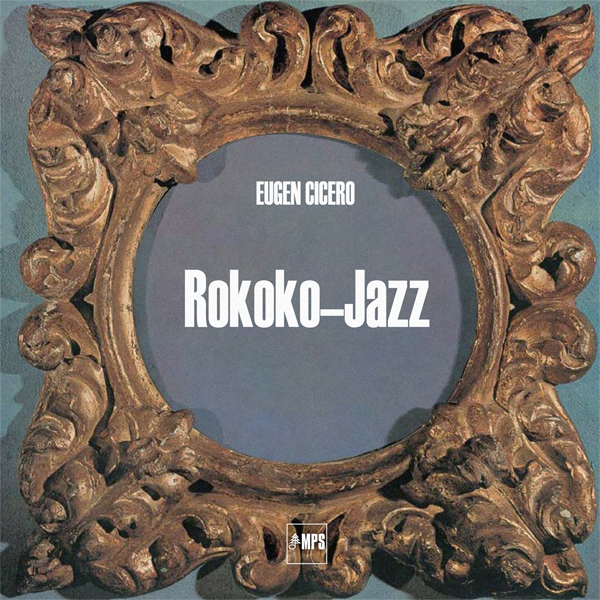
Eugen Cicero – Rokoko-Jazz (1965/2014)
FLAC (tracks) 24 bit/88,2 kHz | Time – 00:32:26 minutes | 576 MB | Genre: Classical
Studio Master, Official Digital Download – Source: highresaudio.com | Front Cover | © MPS – Musik Produktion Schwarzwald
Recorded at MPS Studios, Villingen, March 14, 1965
Pianist (bürgerlich: Ciceu), von dem Deutschen Peter Witte am Baß und dem Schweizer Charly Antolini am Schlagzeug begleitet, versetzt Domenico Scarlatti, Francois Couperin, Mozart und Bach in modegemäßen Swing – nur: Diesmal klingen durch alle Jazz-Entfremdungen die Original -Musiken unverhofft originell hindurch. Ob Mozarts d-Moll -Phantasie oder Bachs Matthäus-Passion – Cicero improvisiert sich jederzeit ehrfurchtsvoll und wohlkonturiert durchs 17. und 18. Jahrhundert. (Saba SB 15027 ST; 21 Mark.)
Eugen Cicero of Romanian-Hungarian descent, was born in Cluj-Napoca (Klausenburg), Romania, on June 26, 1940. His remarkable musical aptitude manifested itself at a very early age. He started taking piano lessons at the age of four and was taught by some of the country’s most renowned teachers. He owed his brilliantly sensitive touch to the instruction he received from Aurelia Cionca, while Ana Pitis initiated him into the virtuoso tradition, as personified by Franz Liszt.
In addition, Cicero studied instrumentation and composition at the National Conservatory in Bucharest. However, neither the prospect of an academic career nor that of becoming a conventional concert pianist appealed to him. He saw these roles as much too restrictive. The key musical philosophy for Cicero was to be receptive towards everything new and to maintain a free spirit in developing his art.
Growing up in a communist country, he found swing music to be a magical source of inspiration. It was therefore almost inevitable that his first concert tour in the sixties took him West to Berlin, the melting pot of European jazz. There, Cicero encountered musicians with a multitude of different styles, and, thanks to his well-honed powers of perception, he was able to adapt some of these to his own musical approach. Soon his personal style crystallized into the so-called Classic-Swing idiom, forging a harmonious link between classical music and mainstream jazz.
The response to Cicero’s distinctive keyboard work was an immediate, widespread and enthusiastic one. His recipe for success was to introduce into exquisite baroque, classical and romantic compositions an infectious swing and sophisticated harmonies, and his gifted and dexterous hands transformed these works into timeless masterpieces.
Many musicians had already sought to combine the classical and jazz idioms, but none of them could match Cicero’s ability to draw on a rich fund of knowledge and extraordinary technical expertise to achieve such an inspired synthesis. Cicero was, without question, the leading exponent of the so-called Classic-Swing style.
A true evaluation of Cicero’s creativity requires not only an appreciation of his tremendous technique but also an ability to listen with the heart. Cicero loved music and he loved his audience. He never played for himself, but for his audiences, which he always succeeded in captivating. His careful selection of originals, prior to each performance, was a pure delight not only for the friends of classical music but also for jazz lovers.
Above all, however, it was the spontaneity and improvisational flair with which he presented his interpretations that transformed each of his concerts into a work of musical art something which is rarely to be experienced in the concert hall today.
In 1976 Eugen Cicero was awarded a German Schallplatten Preis for his arrangements of compositions by Franz Schubert. In addition to more than 70 recordings and numerous domestic and foreign TV appearances, he made pioneering recordings with the Berlin and Munich Philharmonic orchestras. He also toured Japan, a country where he achieved cult status thanks to his thousands of dedicated and loyal fans.
It was not easy for critics to categorize Eugen Cicero’s playing. The designation ‘golden hands’, which was attributed to him throughout his career, was an indication that both music lovers and critics valued his consistently high level of performance, especially at times of radical change in the music scene. Even now, the name of Eugen Cicero stands for amazing musical virtuosity, phenomenal rhythmic feeling and an inexhaustibly inventive genius. -Lisa Boulton, All About Jazz
Tracklist:
Carl Philipp Emanuel Bach
1. Solfeggio in C-Moll 05:39
Domenico Scarlatti
2. Sonate in D-Dur 03:55
François Couperin
3. L’adolescente 05:25
Eugen Cicero
4. Bach’s Softly Sunrise 06:13
Wolfgang Amadeus Mozart
5. Fantasie in C-Moll (Andante – Adagio – Allegretto) 05:23
Johann Sebastian Bach
6. ‘Erbarme dich mein Gott’ (Aus Matthäus-Passion) 05:54
Personnel:
Eugen Cicero, piano
Peter Witte, bass
Charly Antolini, drums
Download:




















![Eugen Cicero - Cicero's Chopin (1966/2018) [FLAC 24bit/88,2kHz] Eugen Cicero - Cicero's Chopin (1966/2018) [FLAC 24bit/88,2kHz]](https://imghd.xyz/images/2022/11/23/4029759114543_600.jpg)
![Eugen Cicero - Balkan Rhapsodie (1970/2017) [FLAC 24bit/88,2kHz] Eugen Cicero - Balkan Rhapsodie (1970/2017) [FLAC 24bit/88,2kHz]](https://imghd.xyz/images/2022/11/23/4250644878800_600.jpg)
![Eugen Cicero - Klavierspielereien (1969/2022) [FLAC 24bit/88,2kHz] Eugen Cicero - Klavierspielereien (1969/2022) [FLAC 24bit/88,2kHz]](https://i0.wp.com/imghd.xyz/images/2022/04/05/4250644878794_600.jpg?resize=500%2C500&ssl=1)
![Eugen Cicero, Decebal Badila - Bucharest 1994 (Deluxe Edition) (2022) [FLAC 24bit/44,1kHz] Eugen Cicero, Decebal Badila - Bucharest 1994 (Deluxe Edition) (2022) [FLAC 24bit/44,1kHz]](https://imghd.xyz/images/2022/11/23/simw32gt0xu2a_600.jpg)
![Eugen Cicero - Solo Piano (1978/2016) [FLAC 24bit/44,1kHz] Eugen Cicero - Solo Piano (1978/2016) [FLAC 24bit/44,1kHz]](https://imghd.xyz/images/2022/01/18/w5cj1wvmjxelc_600.jpg)
![Eugen Cicero - In Town (1965/2016) [HighResAudio FLAC 24bit/88,2kHz] Eugen Cicero - In Town (1965/2016) [HighResAudio FLAC 24bit/88,2kHz]](https://getimg.link/images/imgimgimg/uploads/2018/02/LzY3csE.jpg)
![Eugen Cicero - Romantic Swing: Eugen Cicero plays Franz Liszt (1968/2015) [HighResAudio FLAC 24bit/88,2kHz] Eugen Cicero - Romantic Swing: Eugen Cicero plays Franz Liszt (1968/2015) [HighResAudio FLAC 24bit/88,2kHz]](https://getimg.link/images/imgimgimg/uploads/2018/02/nnQR1dH.jpg)
![Charly Antolini - In The Groove (1972/2015) [HighResAudio FLAC 24bit/88,2kHz] Charly Antolini - In The Groove (1972/2015) [HighResAudio FLAC 24bit/88,2kHz]](https://getimg.link/images/imgimgimg/uploads/2018/01/W21YjCQ.jpg)
![Eugen Cicero - Swinging Tschaikowsky (1966/2015) [HighResAudio FLAC 24bit/88,2kHz] Eugen Cicero - Swinging Tschaikowsky (1966/2015) [HighResAudio FLAC 24bit/88,2kHz]](https://getimg.link/images/imgimgimg/uploads/2018/02/RpKOPpM.jpg)
![Oscar Peterson - Exclusively for My Friends (1968/1992/2014) [HighResAudio FLAC 24bit/88.2kHz] Oscar Peterson - Exclusively for My Friends (1968/1992/2014) [HighResAudio FLAC 24bit/88.2kHz]](https://getimg.link/images/imgimgimg/uploads/2016/03/4IeU874.jpg)
![Jens Schowings Blue Note Bach - Nocturne (2017) [HighResAudio FLAC 24bit/96kHz] Jens Schowings Blue Note Bach - Nocturne (2017) [HighResAudio FLAC 24bit/96kHz]](https://getimg.link/images/imgimgimg/uploads/2018/08/wq6bUJJ.jpg)
![Charly Antolini - Special Delivery (1980/2015) [HighResAudio FLAC 24bit/88,2kHz] Charly Antolini - Special Delivery (1980/2015) [HighResAudio FLAC 24bit/88,2kHz]](https://getimg.link/images/imgimgimg/uploads/2018/01/l9je3Zu.jpg)
![The Art Van Damme Quintet - The Gentle Art Of Art (1967/2015) [HighResAudio FLAC 24bit/88,2kHz] The Art Van Damme Quintet - The Gentle Art Of Art (1967/2015) [HighResAudio FLAC 24bit/88,2kHz]](https://getimg.link/images/imgimgimg/uploads/2018/10/OZF1ZLp.jpg)
![Stuff Smith - Black Violin (1967/2015) [HighResAudio FLAC 24bit/88,2kHz] Stuff Smith - Black Violin (1967/2015) [HighResAudio FLAC 24bit/88,2kHz]](https://getimg.link/images/imgimgimg/uploads/2019/02/e5Fj235.jpg)
![Art Van Damme & The Singers Unlimited - Invitation (1974/2015) [HighResAudio FLAC 24bit/88,2kHz] Art Van Damme & The Singers Unlimited - Invitation (1974/2015) [HighResAudio FLAC 24bit/88,2kHz]](https://getimg.link/images/imgimgimg/uploads/2018/10/ZgdCPfk.jpg)